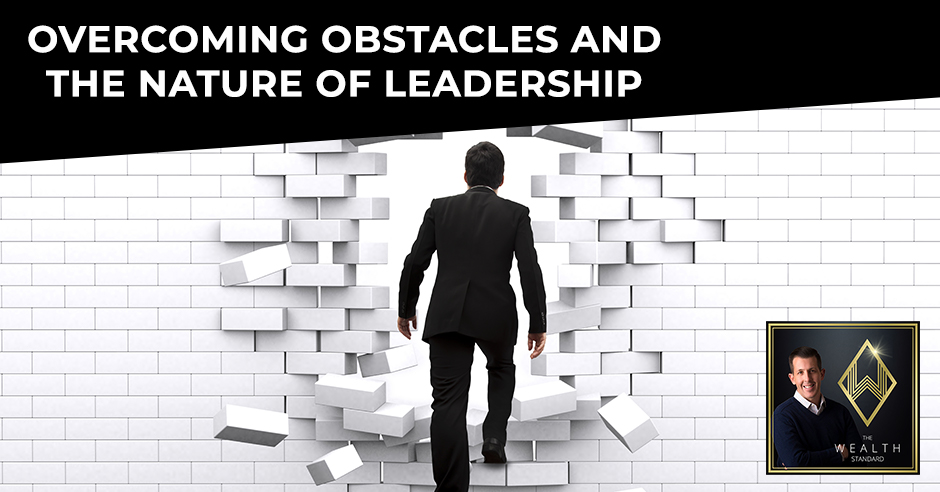Overcoming Obstacles And The Nature Of Leadership

No matter what stage you are in your business, there will always be challenges to face and overcome. The difference between those who succeed and not is how they look at these challenges. In this episode, Patrick Donohoe goes solo to talk about overcoming obstacles in business, particularly the mindset it takes to see them through as a leader. Taking cues from authors and industry leaders, he shares the many lessons and resources out there that can help us realign the nonlinear nature of life that loves to thrust us into uncomfortable places. Join Patrick in this discussion to gain some more wisdom and clarity about overcoming obstacles and the nature of leadership.
—
Watch the episode here:
Listen to the podcast here:
Overcoming Obstacles And The Nature Of Leadership
I hope you have enjoyed the last few episodes. I wanted to first thank the response that we’ve had to the request for feedback in regards to a course that is being created specifically for the audience. Your books are on the way, so you should receive those in the next few days. Although there are some international people that it may take a little bit longer for your books to get there. Nonetheless, thank you guys for your feedback. It was interesting that the feedback was diverse. It wasn’t the sample size that I thought it was going to be. We’re going to extend the survey and do another ten books. We went through the hardbacks. We went through the softback.
We’re going to have a survey. It’s getting a gauge as to where you’re at in business, where you’re at with your investments, where you are with your finances, with your overall sentiments regarding your financial state. That is going to give me a good pulse on the direction to take the different aspects of the course that is being conceptualized. I’m thankful. You have been awesome, thorough, open, honest. I appreciate the candid feedback. Let’s get into the episode.
There Will Always Be Obstacles
I have two topics. First, I want to make the statement that what I had seen in those surveys, what I see with speaking with clients, what I see with the advisors that I mentor is there is always going to be an obstacle. There’s always going to be something that you’re challenged by. There may be this instance where a day or a week, or maybe a month, not much longer than that. They’re always going to be challenges. Even when you accumulate wealth, when you establish a business, there are always going to be challenges.
The non-linear nature of life requires a conditioned linear response. If not, the reaction is going to align with that non-linear and you’re never going to be able to correct the out of control car that’s spinning around these curves. We’re going to talk a little bit about that when it comes to a conversation that I had also with a book that I have re-read. It’s a challenge called 75 Hard. It was put out originally by Andy Frisella, who has a couple of cool motivational podcasts for entrepreneurs, business owners, a straight-up guy. He created this for himself first, but a lot of other people have taken the challenge. In 75 days, you have a checklist of things that you must complete. If not, you have to restart the challenge or quit the challenge.
These checklist items are two 45-minute workouts, one has to be outside. You have to take a picture, like a selfie of yourself to see your physical change over the course of time. You have to drink a gallon of water. You have to read ten pages of nonfiction. You also have to follow a diet. There are no cheat meals or alcohol for 75 days straight. I’m going into week four, about twenty days. It’s going awesome. If you guys want to check it out, search the #75HARD. You can find that out.
The reason I bring that up is that in there are the ten pages. I’ve got into some more books that I’ve been intended on reading. I’ve been reading Shannon Lee’s book who’s Bruce Lee’s daughter. It’s a book about his quote that has so much meaning. We do a whole episode on that regarding being like water. Water takes all sorts of forms and makes its way into whatever it wants to and absorbs friction. It’s a fascinating concept. I won’t get into that now.
There will always be an obstacle, something that you're challenged by. Click To TweetOne book that I’ve gone through during my workouts, as well as reading is Power vs. Force by David R. Hawkins. He passed away in 2011 or 2012, but he wrote some incredible books on a variety of topics. The one, in particular, is the idea of how we show up. Mostly we don’t do it intentionally. We show up randomly non-strategically. There’s a spectrum that exists when it comes to the energy or the feeling we give to others, whether it’s in the words that we use, whether it’s in our overall demeanor, our tonality. There’s a force spectrum and then there’s a power spectrum.
The force spectrum is the intentions, motivations, energies, words that are used to describe the force side of things is pride, ego, anger, and desire. It’s a fear or shame. When you show up that way, the idea of force is that it’s either a net-zero or a net negative. What that means is you create either the same as what you consume or take, or you produce less than what you take. There is power. Power, the words they used to describe this spectrum. They’re different degrees. One is courage. That’s where it starts.
The nature of courage, hero, overcoming adversity, and these are all net positive. Meaning, you’re producing more than you take or consume. There’s neutrality. It’s being able to assess the situation, the nonlinear aspects of life, and handle it rationally with a reason as opposed to emotionally and reacting to it. You have acceptance. You also have words such as reason, love, joy, peace, and enlightenment. This has much to do with wealth and business.
I consider the Pareto Principle. It’s like the 80/20 rule. This is 80%. How you show up, the energy that you put off, who you are and showing up to whatever the circumstance is. Especially if it’s business, you have some control and influence over that. If you don’t intentionally understand the way in which you show up, then there’s 80% gone of success or at random. It’s interesting to perceive the obstacles people have, the fear that they have of not being able to overcome obstacles or what they would look like if you don’t overcome an obstacle.
The Nature Of Leadership
It’s driven by that carnal aspect of our makeup that reacts to things as if we’re going to get murdered, killed or wiped out. That’s where I look at. If you can understand the energy levels associated with power versus force, then you can start to see how you’re showing up. Are you showing up trying to force initiatives? Are you showing up to empower initiative? That’s the first topic. We’re going to talk about that a little bit. The second topic is going to be the nature of leadership.
I had an excellent conversation with a client that I wanted to share with you. There are two things that I pulled from that. This client is successful, younger under the age of 40 or turned 40, and also in an executive-level position that pays high six-figures plus bonus, but it’s in a corporate type of structure. The conversation revolved around the hierarchical order that they’re in wanting to influence change but having a lot of pushback. Feeling also compelled to go out on their own, have more freedom, experience or capitalize on this entrepreneurial spirit that they have in them. Most people that get to that level especially at an early age with that type of ambition have.

Overcoming Obstacles: Even when you accumulate wealth or establish a business, there will always be challenges.
Power Versus Force
First, I’m going to conclude my thoughts in regards to this Power vs. Force: The Hidden Determinants of Human Behavior. There are some different examples and anecdotes that he has in there. It’s a powerful concept. I’ve been able to experience myself and calibrate or know where I’m at, the words I described to use how I’m feeling, what I’m thinking, what my intention is, what my motivation is. If they’re below the line between power and force, which force ends at pride, ego and power begin at courage. It’s knowing there and realizing that if I show up in those power states, the states of neutrality, acceptance, and courage, I’m going to look at the world differently. I’m going to look at opportunities differently.
I’m going to look at the non-linear experiences that I have whether it’s somebody making a mistake at the office or someone misrepresenting this, that, or the other. It could be something a spouse says. It could be something that a sibling says or a child says. It could be that someone you respect says. We are in this volatile environment of emotions when it comes to politics. That is something that you can easily get sucked into. That’s where those types of feelings whether it’s resentment, anger or fear.
You know what that’s like. You can tell when a person is in that state. You can sense it. You understand it. Now if you have some better context where force is going to be a net-zero at best or a net negative, but power is always going to be a net positive. It’s focusing your attention, energy, perspective, the motivation behind powerful forces, those that empower others. You know that. We experienced those energies and those that are most influential. Those that make the biggest difference that commands well. You feel and sense that. That’s the biggest thing.
I’m going to give you some call to actions as far as how do you determine that? What can you do to understand where you’re at and ways in which you can show up? I’ll give you one little insight. What I do at least to see where I’m at on a daily basis is, I would first say that it’s challenging to get into these empowering states to have that state of courage, that state of neutrality, that state of acceptance, that state of joy, and happiness. What you could do is you can use your past, body and mind’s amazing capability to remember the experiences of the past.
We all understand what courage is like. There are moments in our past where we’ve exercised courage, where we stood up to something that was challenging and difficult. We remember how that felt. Neutrality, it’s the same thing. We remember when we were empathetic, neutral to something where all things being equal. It may have come across as something that went against our belief system, what we would’ve done and otherwise would have set us off, but yet we were neutral to it. We found that looking at another’s perspective, understanding, the way they look at things may have caused the behavior. Suddenly that type of reason and rationale allows us to be more indifferent to the situation.
Acceptance, joy, happiness, and success, those types of feelings are within us because we’ve experienced that in the past. We yearn for that. Going to this conundrum of how most people think, which is once they have something, once they have this money, once this occurs, then there’ll be happy. They’ll be in that state. It’s backward. You’re more likely to get everything that you want if you experience and understand that state first.
Be like water because water takes all sorts of forms and makes its way into whatever it really wants to. Click To TweetThis goes into experiencing and understanding what you’re like when you remember the experiences of your life, where you were courageous, empathetic, and you felt on top of the world and things happened, but it was water off a duck’s back. I have these multiple memories that I’m starting to collect that allow me to easily go into a state where I know I’ve made a difference. I know I’ve impacted someone. I know that I’ve stood up to adversity and overcame the adversity. I try to have my days centered around that energy of power as opposed to what we normally gravitate toward as human beings, which is force.
—
Hierarchical Structure In The Corporate World
Let’s move on to part two. What’s interesting about some of the feedback that you guys gave. There are several business owners that responded and talked about some of the challenges with their businesses at various sizes. There are also those that were in successful positions, but they were positions that weren’t entrepreneurial, weren’t their own business. It was working essentially for somebody else. What I would say is that there’s a hierarchical structure in small businesses. There’s also a hierarchical structure in the corporate world. Sometimes people get frustrated with reporting to somebody, having somebody tell them what to do. Therefore, they will go off and try to create something on their own. Be self-employed, be an entrepreneur, and start a business.
I’m going to be the first to tell you that the typical path for an entrepreneur, a small business owner now going off and doing things on your own, you’re going to make the same amount of money net and spend probably twice the amount of time and energy. Running a business, being an entrepreneur, being on your own, it’s a skillset that requires more of you than where you’re at right now. I’m not saying that it’s not possible or you shouldn’t do it, but there is a calculated, strategic way in which you can experience it.
I did an interview. It was an episode that lasted a while. It was with Michael Gerber. He wrote The E-Myth. There’s E-Myth for every profession that’s out there. There are E-Myth principles and then they’re applied to several different types of professions or industries. You also can check out Michael Gerber’s book, The E-Myth. There’s E-Myth Revisited. He has a lot of online content as well. It was an awesome interview.
The interview was scheduled for 45 minutes and we ended up going almost two hours. Go back and read that. Where I was going is if you look at the foundation of success within a corporate structure, within a hierarchical structure or in the small business or entrepreneurial world, the one element is that creates success. It’s that 80/20 Rule is leadership. The conversation I had was with this successful individual. He had accomplished a ton. He has seven figures of savings. He makes high six figures and it’s in the healthcare industry.
He has a leadership position, but it’s not the leadership position. There’s only one more level to go and then he’s capped out. What’s going through his mind is there’s a marginal improvement to get to that level, but is it worth it? Is there something else I can do? Should I go on my own? I’ve established all of this knowledge. It’s one of those things where he has initiatives. He has things that he wants to do to grow the specific group. There are about 100 people to a certain level, but yet there’s someone at the top that hired him that is pushing back.

75 HARD challenge: The 75 HARD-Running: Stay Motivated Journal
There’s this feeling of them being threatened. If this person is able to initiate these types of changes and orchestrate them and achieve success, then it makes them look bad. They’re afraid of looking bad because they’re afraid of being let go, less valuable, etc. I’m going to approach it in two ways. Number one, how I approached him being a leader when it comes to those that are above him, even being able to lead them. It’s also finding opportunities that are derivatives of what your core competencies are, your success is. I’ll explain both of these pieces.
The first one is when you are hired or join a company, it is so rare. I’ve seen it a few times. It’s becoming more available and more apparent that companies are going in this direction, but it’s a good sign when you are hired into a hierarchical order where you’re being hired as a position above the person and have a great interview process. That’s golden. Most people are hired underneath the person that’s hiring them or bringing them on.
In your position, not necessarily in a meritocracy where the order is based on experience, knowledge, expertise, core competency. It’s based on seniority, how long you’ve been there. It’s based on those types of factors. This person was hired within a hierarchy underneath the true leader. It was his role to essentially do their job so that they would be able to go out, make rein, be influential here, there, and the other. It made sense from the beginning, but then it came down to making these types of changes, where it would create improvement. It would avoid obstacles. It would prevent some haywire things from happening, which were evidenced.
It’s a train going on the track. It’s on the track. It’s going at a certain speed, yet there’s a gap in the track right before a bridge or a bridge that’s out. One person can see it, the other can’t. There’s a hierarchical order that says that, “I can’t see it. You can see it. Because I’m in the senior order, we’re going to keep going.” It was a multi-hour conversation. The way that I looked at it, which is how I have learned to run a business is this person who’s seniority to him, they have good leadership capabilities.
It has nothing to do with the change and the initiatives that want to be integrated into the structure of the business. It has to do with the way in which it’s presented. I caught this person essentially saying, “They should know this. That’s their role. They should know what to do. They should know that this isn’t working. They should know this and they should.” It’s one of those things where you try to approach irrational behavior with rational thinking. There’s always a quagmire.
The idea is you need to put yourself in that person’s shoes, understand what they want, understand what their life is about, understand their identity, understand what they’re afraid of, what keeps them up at night. When you know that, then you can see how going on the path that they’re on can lead to what they don’t want. You can talk about that, bring that up, highlight that and have them consider that as a possibility.
Force ends at pride and ego, and power begins at courage. Click To TweetAt the same time, you can’t go in and say, “This is what we’re going to do. Here’s my plan,” because then you’re leaving it up to them to define the meaning of that, and whether you’re trying to usurp their authority or whether you’re trying to help. The context of the conversation and recommendation is way more important to set from the very beginning. The best way to do that especially in hierarchical order is to understand what this person wants. What are they afraid of? What are they passionate about?
This person happened to have a lot of layers of identity that they were trying to protect. They felt threatened by the change that would make them look bad. At the same time, the path that they were going down was going to compromise all the different aspects of their identity, to begin with. That’s where we went. We started to highlight how can you have a conversation with this person and come at it from a neutral perspective, energy, and go in and say, “You want to do this. You want to make rein. You want to be on these boards. I know you’re passionate about that. I know it’s making a difference and here’s what I’m seeing in the future. I see that we’re going on this path. Because of my experience of what I’ve seen at other groups and other companies I’ve been with, this is what the end result is going to be. Here’s where I think we can establish a few pieces of change here, a few pieces of change here, and this is how it’ll get you what you want.”
It may not say it in those words but essentially allude to the fact that it’s going to help them to be better, to get what they want. It’s done in a collaborative fashion. We went into a lot of other details. The idea is that when you’re in this hierarchical order, the greatest fear somebody has is looking bad. If they look bad, the results of that are going to be them losing their job, their position, and losing their credibility. That is going to compromise what is most important to them. You got to work your way backward. You got to start with what’s most important to them? What do they want? What are they after? What are they passionate about? What are they striving for?
Try to view the world the same way they view the world and then approach it, showing how the path that they’re on is ultimately going to lead based on the experience of the new to a place that they don’t want. They may not be able to see it. It’s providing a replacement of their belief system, their perspective with an alternative that will get them what they truly want. Approaching that way is strategic, at the same time, this is where true leaders are. You can be a leader whether you’re the mailroom person or you can be a leader at that level of executive.
At the same time, the same principles apply. Even though there’s way down in the pecking order and the way high up on the pecking order, human behavior, human nature is always relevant. As you can imagine, a person that is at this prestige, that is ambitious, that is young, that is accomplished a lot, they’re thinking of plan B. If they can’t ram through their plan A, which is, “This is what we need to do you should know that, and you should accept my proposal,” they’re thinking of a plan B.
Plan B is, “I’m going to go somewhere else. I’m going to go to another company. Somebody is going to value me more or I’m going to go on my own.” It was interesting because I did an episode a number of months ago where I talked about how the Native Americans would capitalize on every aspect of the buffalo. The same thing with a cow and petroleum, where you have this one central commodity and one central thing, but there are many derivatives and uses out of it. We had that conversation and this individual was very entrepreneurial and driven.

Be Water, My Friend: The Teachings of Bruce Lee
We started to identify the different factions of their value. We started to look at what is their experience? What are they passionate about? What are the ways in which they can do a little bit of a derivative in certain areas? We identified a couple of opportunities. I’m going to give you that example and I’ll cut to some of the calls to action that I came up with. Regardless of where you’re at, you can apply a similar perspective as this individual that I had a great conversation with.
The derivative was he had expertise in the medical field and it was in the merger acquisitions business side of things, business structure. He also had many different contacts in that field of different medical companies, pharmaceutical companies, health networks and insurance companies. He had many executive-level contacts. I said, “What are opportunities where you’re seeing the medical industry go? What direction is it going? What do you see as the future?”
It went to these different startups and incubators that have been created in the city that he’s in that will be forming little specialized services, some of them are medical devices, but essentially it was a startup world, an incubator world of the medical industry. He identified not just one but a couple of them. That’s where I said, “Do you know anybody that’s there? Somebody that is part of it, that’s running it.” He had those relationships.
It went into what role could you play in order to not only have influence in those areas where you can provide some legal and business consulting on a small scale. It’s a derivative of what he’s already doing, but be able to influence good and also potentially have an opportunity for investment and grow his wealth, but then it could lead to a more firm consulting opportunity. I’m not sure what’s going to happen. I’ll know if he took action, which I guarantee he’s already taken action knowing him. The idea is that those opportunities existed. Our mindset is focused on what our primary core competency and obligations are.
Depth Versus Breadth Of Experience
We often don’t necessarily look at, within those competencies, is there a value that can be derived from that and applied to other areas of the business world as opposed to having to go off and completely start fresh and do something new? It’s being able to identify opportunities, whether it’s consulting, freelancing, etc. The thing I wanted to say in that regard, it’s the breadth versus depth. There’s this interesting concept in a business where you can have a depth of experience, which is extreme specialization, or you can have breadth, which is a wide range.
You’d go wide and shallow or you can go narrow and deep, or you can start doing a hybrid. It’s being intentional about your breath, knowledge, experience, specialty, as well as your depth. That is an interesting observation that you can make where you start to realize potential opportunities to go deeper into your field. Opportunities where you can gain even more specialized knowledge or you can start to go to the next level breath wise horizontally where you can start to understand maybe derivative aspects of your field.
Running a business, being an entrepreneur, and being on your own requires more of you than where you're at right now. Click To TweetIn the end, this is what leads to you making not only the biggest difference and the most amount of money, but it’s being the most fulfilled. I’m going to be the first to say that you don’t have to go out on your own and form a business in order to do this. There are many opportunities. Even more so with COVID-19 and what it has facilitated as far as remote work. People are working from all over the world now where they had to be in a specific centralized location in the past. I look at the tremendous opportunity that exists to number one, identify your core competencies. Identify your strengths. Identify what I call human life value assets that I talk about in the book and start to leverage those.
Start to apply them to different areas with different companies and splinter or create derivatives of that and test here and test there. You don’t have to completely jump ship in order to pursue these types of ventures. What I would say is that from a call to action standpoint with regards to this second part of the episode, you get to know objectively and not just use assumptions or gut reaction as to where your strengths and passions are. This is the know they self where you can look at different assessments that are more objective in nature. The first that I love is Kolbe, the second is StrengthsFinder. The third is the Myers-Briggs.
It’s not simply taking these tests, but it’s studying and understanding the reports. Within those reports, it’s finding if you were to break down the talents, the passions or the fulfillment. As you take those assessments, what do you feel the most strongly about? Were they spot on more than any other area? That’s a signal for you to focus on where they nailed everything almost verbatim. That is where you can start to understand your competencies, where you’re passionate about and find opportunities where you could potentially go deeper.
You can enhance or magnify the depth of what you know before you go horizontally and the breadth of it. Going to The E-Myth, most people when they get frustrated in the hierarchical order of working in a structure, they pursue this path of entrepreneurship, self-employment, and starting their own business. Their core competency is in this little narrow niche whether they know it or not, but yet they take on a breadth of things. Whether it’s, you got to know some accounting, marketing, sales, all these other aspects of things.
It’s an interesting dynamic where you look at people that want to be freer. They want to have more opportunities. They want to make more money. Oftentimes, it’s the paradox. What you should be doing is probably the opposite of what you’re inclined to do. One of the calls to action for you is to know yourself at a deeper level, take these tests. You’ll spend maybe $100 on them, but they will be golden. In there, it objectively shows who you are, why you’re paid, what value you’re bringing to the world.
You can also assess what aspect of those reports is your core and use that as an indicator of what to pursue and find ways in which you can go deeper. A great way to determine that is within that niche, what’s your maximum income? What’s the maximum income in that specific area that these types of reports and self-assessments give you? I study mine all the time. I look at them. Sometimes I’m frustrated by them because I’m inclined to do this, that or the other, but they keep me in my core.

Power vs. Force
The second thing is a call to action I’ve already mentioned this and this goes to part one. From where you show up, your most common and consistent state, is it in a position of force or is it in a position of power? Are you showing up afraid? Are you showing up prideful? Are you showing up angry or resentful? Are you showing up courageously? Are you showing up neutral? Are you showing up with a feeling of acceptance that regardless of what happens, it’s happening for you? It’s not happening to you.
Get a pulse on that and then find some core memories of where you showed up as a hero. You overcame adversity, find those memories where you were neutral, where you were empathetic, where you took control and did it in an empowering way. When you find those, that is one of the best shortcuts to try and to show up every day. Maybe you start showing up in business settings, in meetings, in presentations, and then start applying that to your relationships, starting to apply that to your social relationships.
That’s it. This was a cool episode. It’s something that’s been on my mind. Hopefully, you found value in some of these nuggets. Go head over to TheWealthStandard.com. There’s an episode page for every single episode. Within that page, you can find those links. I’m going to put another plugin for feedback and assessments. That assessment will take you probably ten minutes or so. That feedback is going to help me tremendously because I’m already spending a ton of time putting together content, putting together videos, putting together a course that I believe encompasses the philosophy of the book. It also encompasses the philosophy of the show and the different themes and topics we’ve had over the last few years. It encompasses it in an actionable, personalized way.
I’m excited for that to come out. I want to be as double, triple, quadruple accurate as possible. That’s only going to come from your feedback. Thanks a ton. Thanks for reading. I appreciate it. If you found value, pass it on to others. I spend money on this. I don’t make any money doing the show other than providing value to the other companies that I have. Share this with others, get the word out. These are things that I believe come back when you’re able to share value with others and they find value in it. It’s this compound effect. It always comes back to you. We’ll see you in the next episode. Take care. Bye.
Important Links:
- 75 Hard
- Power vs. Force
- Michael Gerber – Previous episode
- The E-Myth
- E-Myth Revisited
- Kolbe
- StrengthsFinder
- Myers-Briggs
Love the show? Subscribe, rate, review, and share!
















